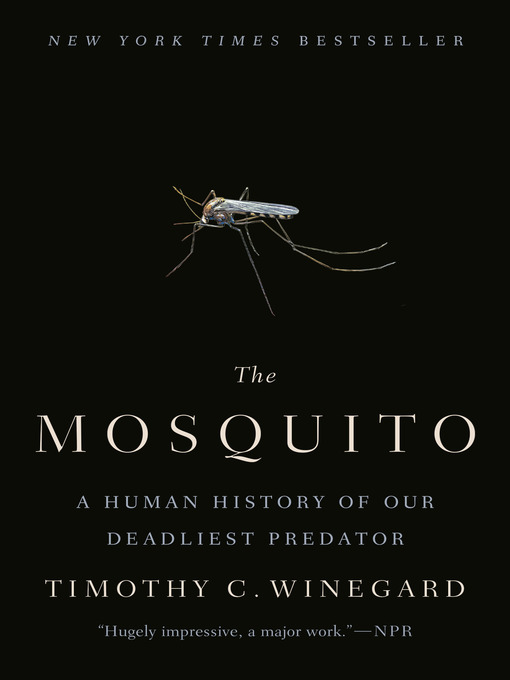
The Mosquito
A Human History of Our Deadliest Predator
تاریخ بشر اولین مقدمه ما
کتاب های مرتبط
- اطلاعات
- نقد و بررسی
- دیدگاه کاربران
نقد و بررسی

June 3, 2019
Winegard (The First World Oil War), a Colorado Mesa University history and political science professor, delivers an adequate, Western-centric world history focused on the part played by mosquitoes and mosquito-borne disease. He begins by introducing the Anopheles and Aedes species and the yellow fever and variants of malaria that they spread. Winegard then marches forward through history, highlighting events (generally wars) he sees as affected by the insects. When armies suffer enormous casualties due to disease, as they did in ancient Greece or colonial wars in the Caribbean, this connection is obvious and easily acceptable. Other connections are more tenuous, as when Winegard seems to give mosquitoes some credit for the Magna Carta. Further weak points include anthropomorphizing references to the subject which cast mosquitoes as mercenaries, generals, or allies in human conflicts, and occasional indulgence in alliteration (“a marshy morass and a minefield of malarial mosquitoes”). Winegard covers both major points, such as how 18th-century geopolitics were reshaped by the huge losses which malaria and yellow fever inflicted on European troops in the Americas, and trivia, such as Dr. Seuss’s anti-mosquito propaganda for WWII GIs. Despite some flaws, this works as a reasonable general introduction to one miniscule animal’s outsize effect on human history. Agent: Rick Broadhead, Rick Broadhead & Associates.

June 15, 2019
A wandering treatment of one of life's constant annoyances and worse. "We are at war with the mosquito," writes former military officer Winegard (History and Political Science/Colorado Mesa Univ.; The First World Oil War, 2016, etc.). There's reason for that: There are something like 110 trillion mosquitoes floating around humankind's ankles and nostrils at any given moment, and when you count up the death toll from malaria, Zika virus, dengue fever, and the like, mosquitoes are responsible for some 830,000 human deaths per year, logarithmic orders from the 10 or so humans who fall victim to sharks. Indeed, writes the author, doing the math, as many as half of all the humans who have ever lived may have fallen to mosquitoes, especially in the days before we discovered quinine, gin and tonics, and DDT. The case isn't overwrought; yellow fever alone is a cause for much misery in Africa and has otherwise been "a global historical game-changer." Winegard's drawn-out survey of history covers ground that is largely well known, including the role of mosquito-borne illnesses in the American Revolution and Civil War and the long effort, planned under Julius Caesar but not effected until Benito Mussolini's reign, to drain the Pontine Marshes outside Rome. The author does uncover some lesser-known moments, however, such as the malaria research conducted by Chinese scientists during the Vietnam War, and he's good on why some human populations seem more vulnerable to mosquito-borne illnesses than others. Overall, the book is serviceable but less fluent than Sonia Shah's The Fever, David DeKok's The Epidemic, Michael Osterholm and Mark Olshaker's Deadliest Enemy, and other popular accounts of all the malign things that await us out in the open air. And readers could probably have done without the anemic valediction to the fanged female at the close: "My judgment of her now vacillates between that sincere, loathing revulsion and a genuine respect and admiration." An intermittently interesting but overlong book that is not likely to make much of a buzz.
COPYRIGHT(2019) Kirkus Reviews, ALL RIGHTS RESERVED.

June 21, 2019
The mosquito is humanity's most deadly predator. In 2018, nearly 830,00 people died from mosquito-borne disease. Wars have been lost and campaigns derailed because of malaria, yellow fever, dengue fever and other diseases. Winegard (history, political science, Colorado Mesa Univ; The First World Oil War) doesn't add new insight to this history, but his account makes it accessible for readers of natural history. The narrative addresses the insect's evolution and capabilities, along with its future in the face of present-day genetic research and efforts of organizations such as the Gates Foundation to eradicate malaria. The bulk of the book, however, is little more than a potted summary of world history, with an emphasis on military campaigns, one of Winegard's enthusiasms. Though the work begins and ends well, Winegard repeats the same points often, is prone to digression, and his deployment of footnotes is heavy-handed, sometimes jejune. VERDICT There's room for a popular history on this fascinating topic, but readers should be cautioned that this study is uneven.--David Keymer, Cleveland
Copyright 2019 Library Journal, LLC Used with permission.

























دیدگاه کاربران